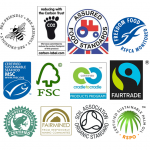An interesting conversation today with a consumer insight specialist (thanks Mercedes) raised an issue I’ve wondered about before, but only from the brand side – how does one measure ‘green-ness’.What I learnedwas that in fact this is a highly topical consumer issue, with brands currently dividing into 3 camps in their consumer communication:
1. Go the 100% route – so brag about what you have, the full of goodness route – 100% recycled, 100% organic (though thats not, technically, green), 100% natural (again, not technically green 0r good – c.f. arsenic = natural = not that good for you) – mostly this is about finding 1 thing to shout ab0ut and ignoring the rest, in a charitable way.
2. Go the ZERO route – zero waste, zero emissions, zero water use – sometimes this is a fiddle – only a measurement of only one thing in one place not the whole life cycle – eg. our factory has no waste (but all our suppliers and retailers have tonnes) – a very hopeful route.
3. Go the ‘faith’ route – otherwise known as getting another brand to endorse you as green. Ideally via independant ‘eco-labels’ such as Fair trade, Carbon Trust (footprints), the EU ‘Flower’ (yes, really, they need to rebrand their sustainability labelling!)
Actually what these really amount to is Faith, Hope and Charity (in reverse order!)
But our discussion quickly identified several obvious flaws in all this – consumers don’t know who to believe, they don’t have any knowledge to assess the context of these claims, and standards change quickly over time, plus its all so ‘self-selective’ that there is no requirement to identify the things that outweigh the good stuff. And even the eco-labels supported by real quantitative targets are poorly understood by consumers (and often, by businesses!).
So consumers have no real benchmark, and this results in 2 dominant points of view:
– EITHER “I don’t believe any of it, its all irrelevant hype (I just want tasty biscuits and cheap cars)”
– OR “See, this just shows businesses are already doing what they need to to address things, and I’m sure there’s legislation to make them, so I don’t need to worry about it.”
Interestingly, both of these echo the research results reported today by the BBC that climate change skepticism is on the rise in the UK – 4 in 10 think experts are still debating it, and 1 in 5 are hardline deniers. So if we think other people aren’t sure, and we think someone’s doing something about it anyway, why bother changing any of my behaviour?
So what is the solution to give consumer’s an easy benchmark without overwhelming them with (nutrition style) irrelevant information?
Anyone any consumer experience to add to the mix? Do post a comment!



